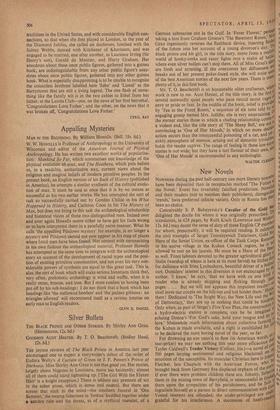Appalling Mysteries
MAN IN THE BEGINNING. By William Howells. (Bell, 18s. 6d.) W. W. HoWELLS is Professor of Anthropology at the University of Wisconsin and editor of the American Journal of Physical Anthropology. He has written two excellent works of popularisa- tion: Mankind So Far, which summarises our knowledge of the physical evolution of man, and The Heathens, which puts before us, in a readable, authoritative way, current views about the religious and magical beliefs of modern primitive peoples. In the present book, an English version of his Back of History (published in America), he attempts a similar synthesis of the cultural evolu- tion of man. It must be said at once that it is by no means as successful as his two earlier works. He has attempted the sort of task so successfully carried out by Gordon Childe in his What Happened in History, and Carleton Coon in his The History of Man, but does not bring to this task the archaeological scholarship and historical vision of those two distinguished men. Indeed over and over again Howells seems either to have got his facts wrong or to have interpreted them in a painfully naive manner. What he calls 'the appalling Piltdown mystery' for example, is no longer a mystery and Piltdown should not now appear in his map of places where fossil men have been found. Not content with summarising in his own fashion the archaeological material, Professor Howells has attempted at the same time to integrate with the archaeological story an account of the development of racial types and the posi-
tion of existing primitive communities, and not even his very con- siderable powers of synthesis are equal to this great task. This is, alas, the sort of book which will make serious historians think that, very often, prehistoric archaeology is wind and waffle, when it is really stone, bronze, and iron. But I must confess to having been put off by his sub-headings: I do not think that a book which has headings like 'the mellowed howlers' and 'the jealous gibbons: no triangles allowed' will recommend itself as a serious treatise on early man to English readers.
GLYN E. DANIEL










































 Previous page
Previous page